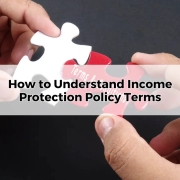How to Get the Best Income Protection Quotes
Table of Contents
ToggleIncome protection insurance is one of the most important financial safety nets you can have. It provides regular payments if you are unable to work due to illness or injury, ensuring that your essential expenses—such as rent, mortgage, bills, and living costs—are covered. In a world where income is central to maintaining your lifestyle, protecting that income is a prudent move. Life can be unpredictable, and having a financial cushion in place helps protect your future, giving you peace of mind if things don’t go as planned.
Assessing Your Income Protection Needs
Before you dive into gathering quotes, it’s crucial to assess how much income protection you actually need. This involves calculating your monthly expenses, including mortgage or rent, utilities, food, and any other essential costs. Consider potential risks to your income, such as a physical injury that might keep you from working, and your current savings. Aim for a policy that will cover 75% of your income, as this is generally the maximum amount most insurers will pay, while ensuring it aligns with your lifestyle and financial obligations.
Understanding the Different Types of Income Protection Policies
Income protection policies come in different forms, and understanding the distinction between them can help you get the right coverage. The two primary types are indemnity and agreed value. An indemnity policy pays a percentage of your income at the time of your claim, which could be lower if your income has decreased since taking out the policy. On the other hand, an agreed value policy locks in the amount you’ll receive, regardless of any changes in your income. Additionally, there’s the choice between short-term policies, which cover you for a set period, and long-term policies, which provide protection until retirement age.
The Importance of Waiting Periods
Waiting periods refer to the amount of time you must be off work before your income protection payments kick in. This period can range from two weeks to two years, depending on your policy. Choosing a longer waiting period can reduce your premium, but you’ll need enough savings to cover your expenses during that time. On the flip side, a shorter waiting period may increase your premium but provide faster financial relief. Align your waiting period with your personal savings and financial cushion.
Benefit Periods
The benefit period determines how long your insurer will continue paying you if you’re unable to work. You can opt for a shorter benefit period of two or five years, or choose a policy that covers you until retirement age, which is often considered ideal for long-term security. While a longer benefit period provides more protection, it also increases your premiums. The key is to find a balance between sufficient coverage and affordability, ensuring that the duration matches your needs and risk tolerance.
Factors That Influence Income Protection Premiums
Several factors play a role in determining how much you’ll pay for income protection insurance. Your age, occupation, and lifestyle are significant. For example, people in high-risk professions, such as construction or manual labor, will generally face higher premiums than those in lower-risk office jobs. Smokers, heavy drinkers, or those with risky hobbies like skydiving can also expect higher premiums. Policy features such as benefit periods, waiting periods, and optional extras will also impact the cost. Understanding these factors helps you make informed decisions when requesting quotes.
Customising Your Policy for Maximum Value
When tailoring your income protection policy, it’s important to strike a balance between comprehensive coverage and unnecessary add-ons that drive up the cost. Insurers offer a range of optional extras, such as cover for rehabilitation expenses or additional benefits for specific injuries. These can add value, but not every option will be relevant to your situation. Ensure that any extras you include serve a real purpose for your lifestyle and risk profile, giving you a policy that provides maximum value without overpaying for features you won’t use.
Using an Income Protection Calculator
Many insurers and financial websites offer income protection calculators, which are useful tools for estimating your premium costs. By inputting basic details such as your income, occupation, and desired coverage, you can quickly generate an estimate of what you might expect to pay. However, while these tools provide a helpful starting point, they may not consider more complex factors such as your medical history or the specifics of certain policy options. Use them as a guide, but don’t rely solely on them for your final decision.
The Role of Financial Advisers in Getting the Best Quotes
A financial adviser can be instrumental in helping you get the best income protection quotes. Advisers have access to a broad range of policies and can compare options across multiple insurers. They also have the expertise to help you understand complex terms and conditions, ensuring that you choose the policy that truly fits your needs. An adviser can also negotiate on your behalf, helping you secure better rates or more favorable terms. Their guidance can prevent you from making costly mistakes and ensure your coverage is adequate without overpaying.
Comparing Quotes
When comparing income protection quotes, don’t just focus on the price. It’s essential to look at the fine print. Consider the waiting period, benefit period, and any exclusions or limitations that might prevent you from making a claim. For example, some policies exclude certain medical conditions, or may only cover specific types of injuries. Understanding these details will ensure that you aren’t caught off guard when it comes time to claim. A thorough comparison also includes reviewing the insurer’s reputation, claim history, and overall financial stability.
The Impact of Health and Medical History on Premiums
Your health and medical history can significantly affect the income protection quotes you receive. Pre-existing conditions, such as diabetes or heart disease, can lead to higher premiums or exclusions from coverage. Insurers assess the likelihood of you making a claim based on your health profile, so maintaining a healthy lifestyle can help lower your costs. If you do have a medical condition, work with a financial adviser to explore strategies that might help reduce your premiums or find insurers who specialise in covering individuals with similar conditions.
Regularly Reviewing and Updating Your Policy
Income protection isn’t a “set it and forget it” policy. Over time, your financial situation and income may change, and your insurance needs should evolve with it. It’s essential to review your policy regularly, especially after major life events such as a promotion, new job, or family changes. By staying proactive and adjusting your policy as needed, you ensure that you always have the right level of protection, whether your income increases or you need to modify your coverage to suit new circumstances.









